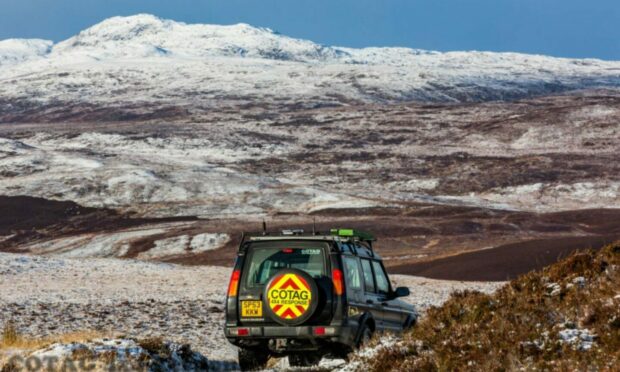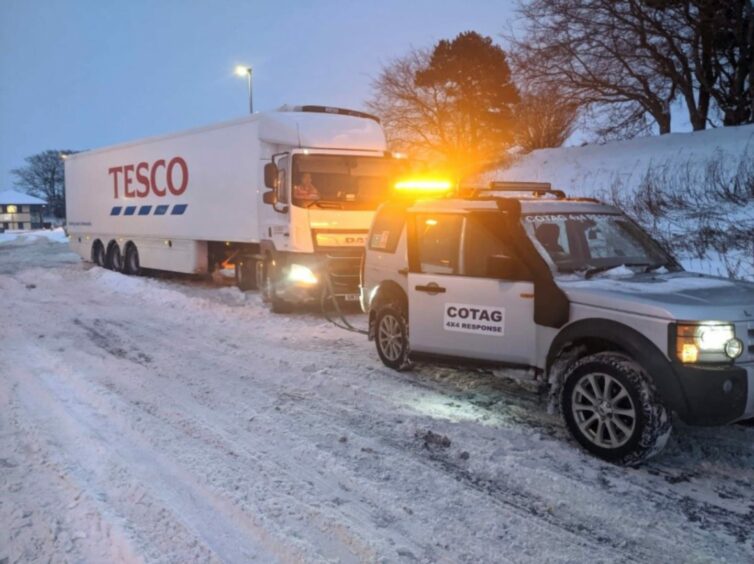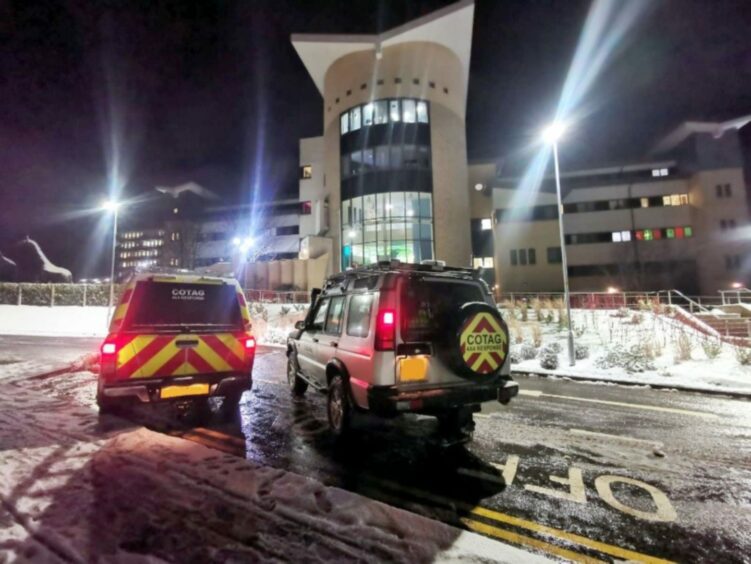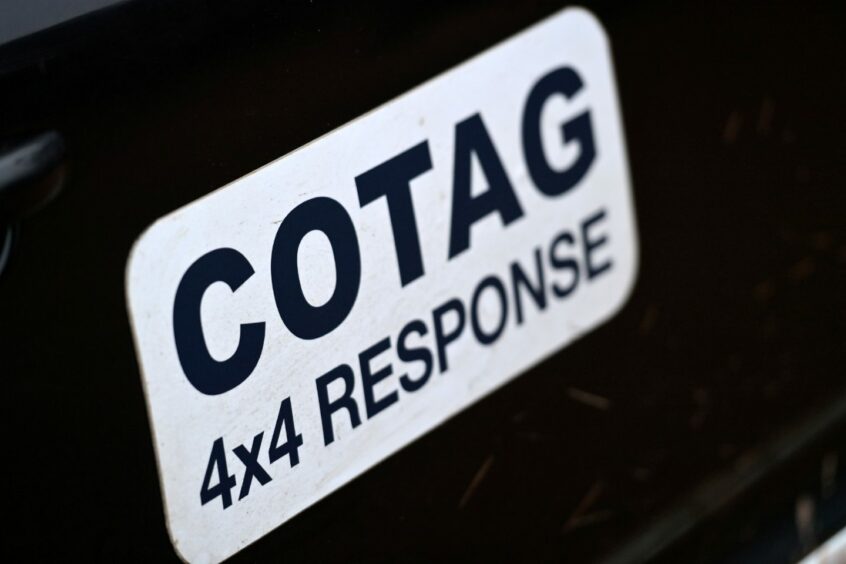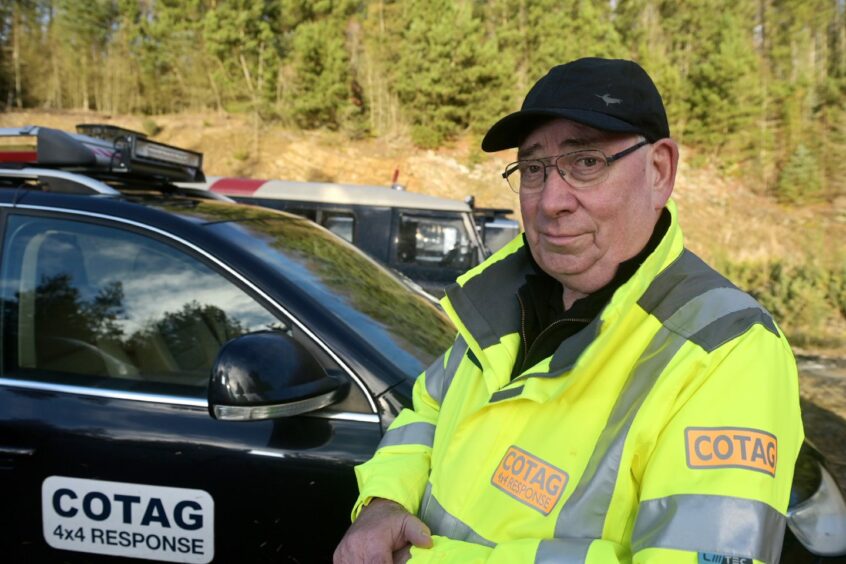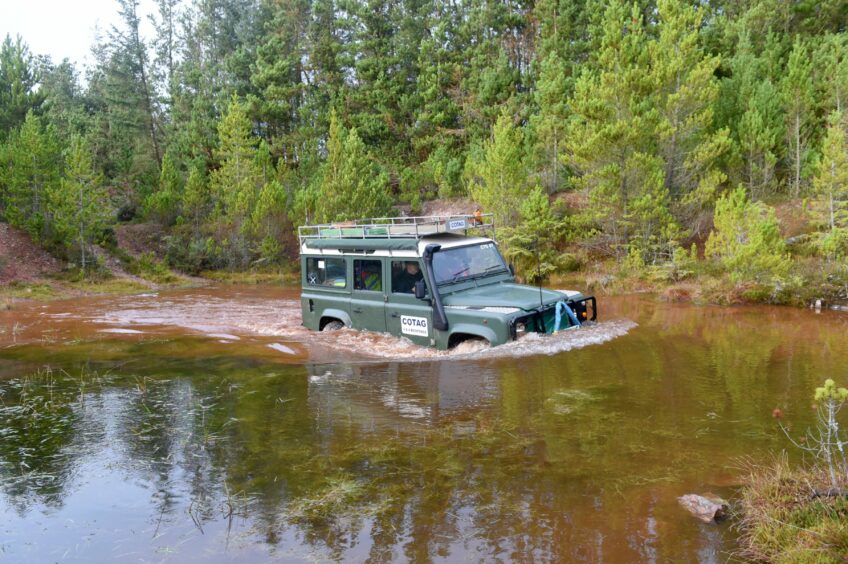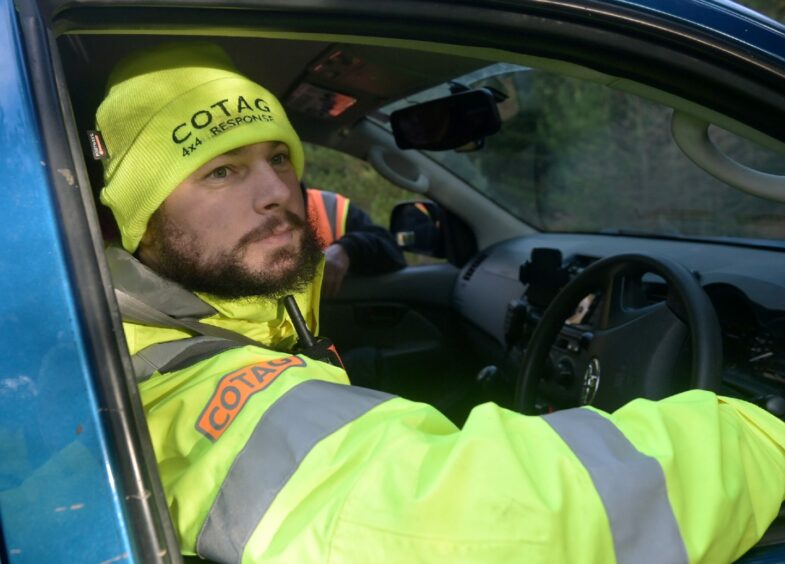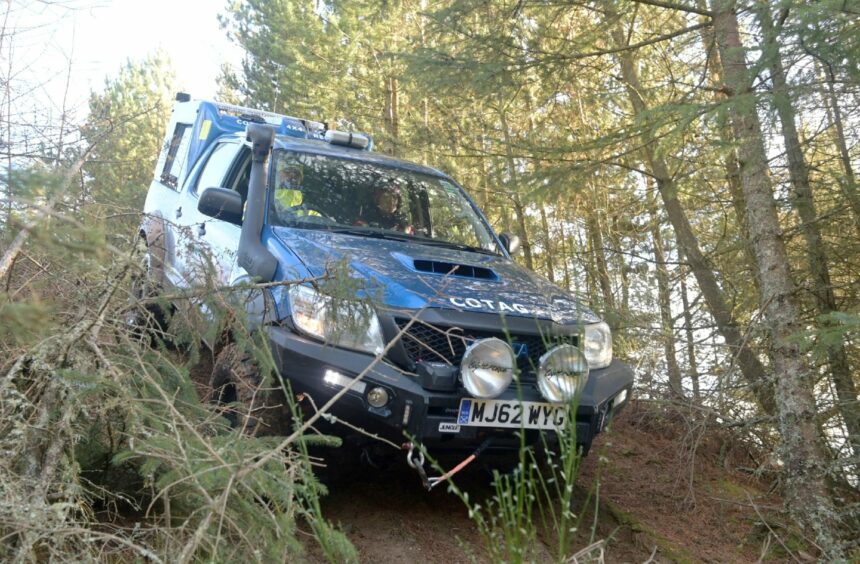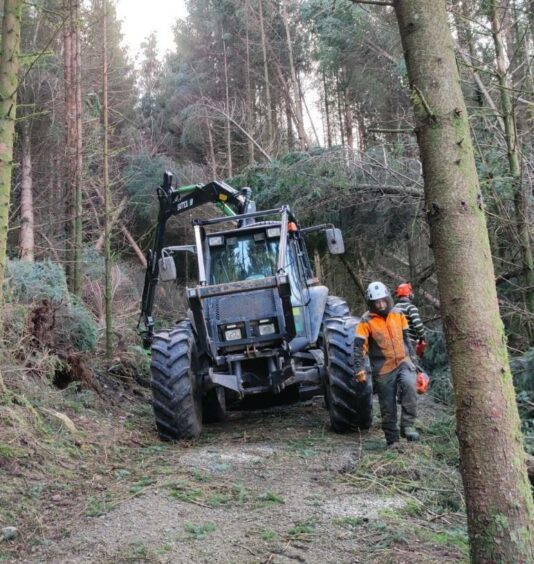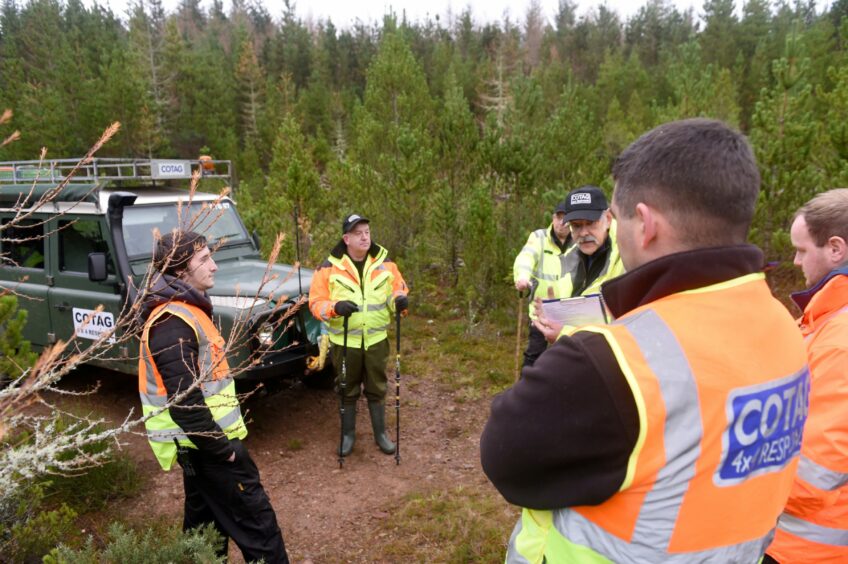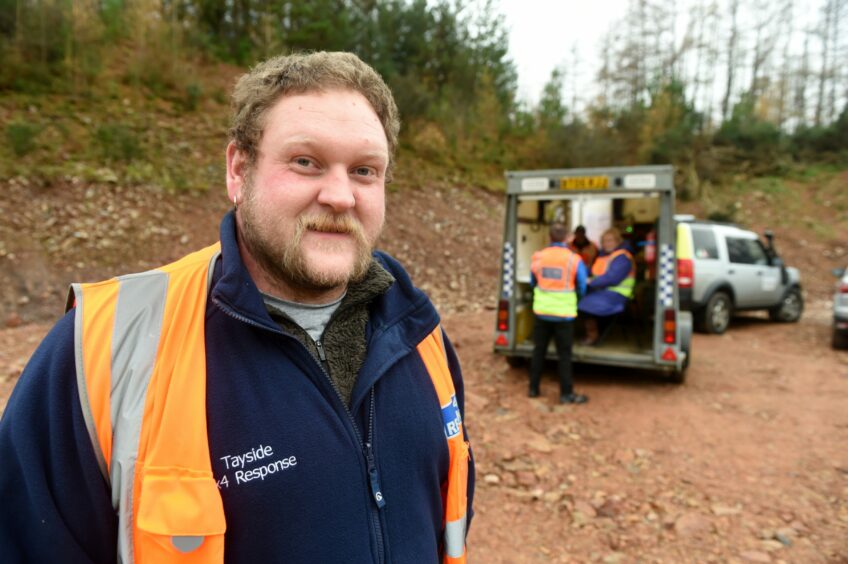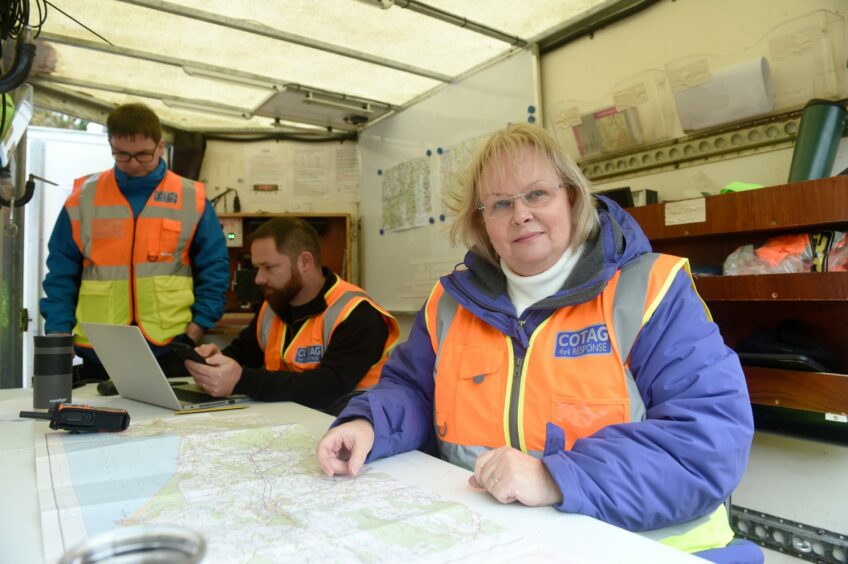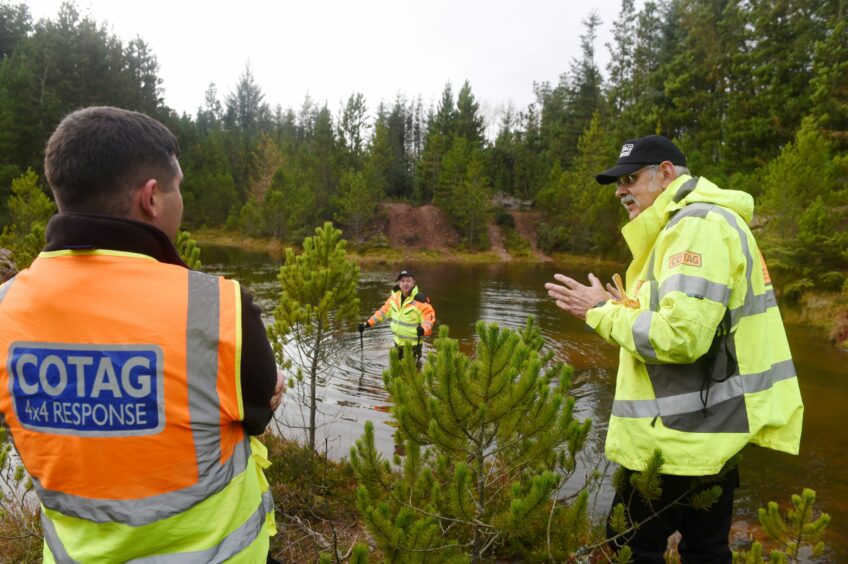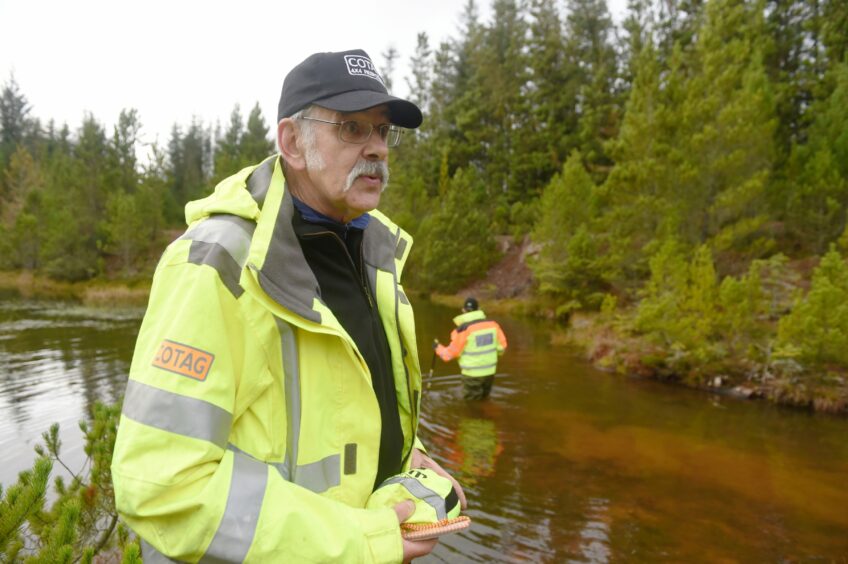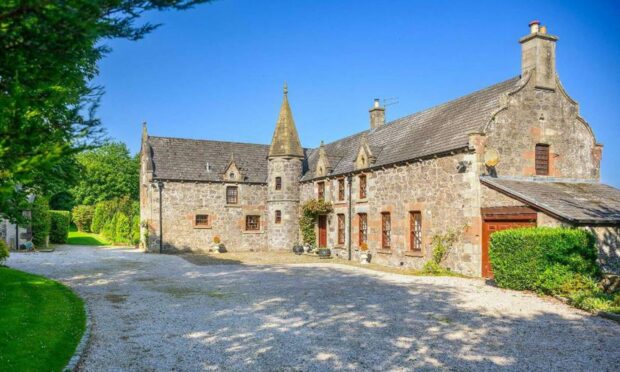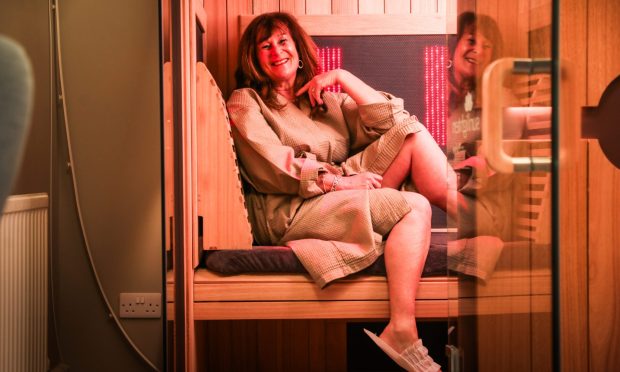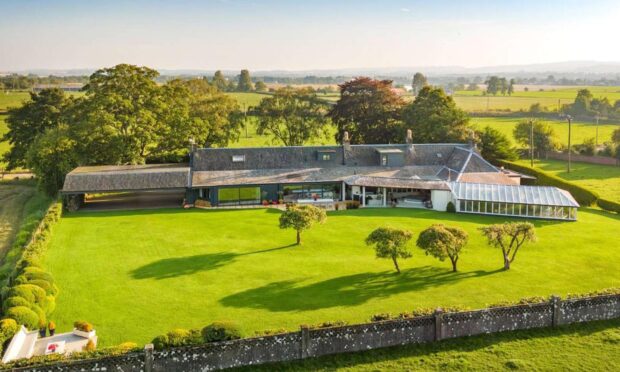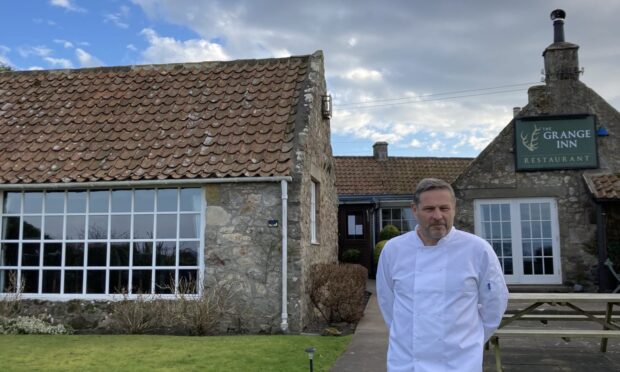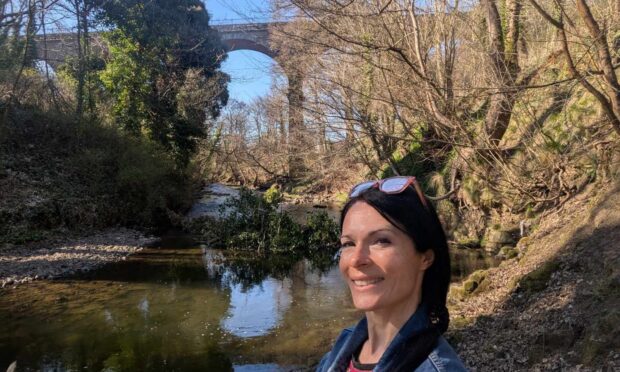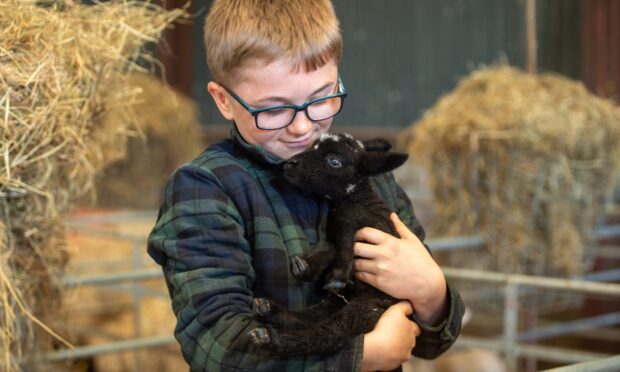A group of volunteers with modified 4x4s are helping communities across Scotland in times of crisis. Gayle Ritchie joins a training exercise with COTAG – the Community Offroad Transport Action Group.
The snow was falling thick and fast, and the remote country road was becoming a total whiteout.
Slowing to a snail’s pace, the delivery driver made the mistake of putting his foot on the brake.
His van slid, and slewed sideways – hitting a dry stane dyke – and landing up stuck in a deep snow drift.
There was no way he was getting out of there himself, and with the wind howling like a banshee, and blizzard conditions worsening by the second, panic set in.
He was lucky to have phone signal, and rang the AA. But with the roads becoming increasingly impassable, it wasn’t the AA who set out to rescue him.
Instead, it was a young man with a 4×4 – an unpaid volunteer who had spent a small fortune kitting out his Toyota Hilux with specialised equipment, rendering it capable of navigating all terrain, in all weathers.
The relief on the delivery driver’s face was tangible when he saw the bright lights of the vehicle – like a beacon of hope – cutting through the darkness.
And he was beyond grateful to receive a flask of tea and a biscuit from the volunteer driver while he waited for his van to be hauled out of the snow.
Scenarios like this are common all over the north-east of Scotland, with members of the Community Offroad Transport Action Group (COTAG) 4×4 Response, springing into life at the first sign of a weather warning.
Most people who find themselves trapped or stranded, whether by blizzards, severe flooding, drifting snow or ice-covered roads, are helped by the emergency services, but sometimes, the task of reaching those worst affected falls to COTAG volunteers.
Each volunteer – there are currently 44 – can fork out thousands of pounds modifying their 4×4 vehicles, enabling them to travel across all kinds of terrain, in the worst of Scottish weather.
COTAG volunteers spend a year training for the role and they not only help motorists – they also assist Police Scotland, councils, NHS staff and health and social care workers to get to work.
Many see it as a chance to combine their hobbies – a love of 4x4s and offroad adventures – with doing something community-minded.
History
Founded in 2004, COTAG is a registered charity with members from across Aberdeen, Aberdeenshire and Moray.
They’re trained in offroad driving, first aid, the operation of VHF radio, and are all qualified advanced drivers.
Tasks include transporting people to and from remote locations in severe weather, and delivering medical supplies to hospitals and health centres, from Aberdeen Royal Infirmary to Dr Gray’s Hospital in Elgin.
They also deliver food and water, and distribute flood defence materials such as sand bags.
Volunteers can be spotted supporting police officers, checking out potentially risky routes and reporting back, and recovering vehicles and relocating them to safety.
They can sometimes be seen manning check points and offering radio communication support at charity events, whether marathons or sponsored hikes, held in remote areas.
Teaming up
The drivers also regularly team up with fellow members of Tayside, Lothian, Strathclyde and Highland 4×4 Response groups for training days.
All vehicles are owned by volunteers, and while they fund associated costs, from fuel to maintenance, themselves, COTAG provides PPE, vehicle-mounted radios and first aid kits.
Monthly training sessions are held at COTAG’s dedicated 350 acre off-road training site near Alford.
Forest training
COTAG also uses an area within Aultmore Forest in Moray. This boasts a purpose-built deep water wading pool, enabling volunteers to learn how to tackle flooded roads.
The organisation is funded via donations, with local businesses chipping in to offer financial support.
However, the name COTAG isn’t yet a well-kent one, and the charity’s full title – Community Action Transport Action Group 4×4 Response – doesn’t quite trip off the tongue.
But with myriad rescues taking place, it’s time members got the respect and recognition they deserve.
Training day
When I was invited along to COTAG’s winter training day, I jumped at the chance.
I love driving, but alas, my silly rear-wheeled car was never going to be allowed anywhere near the tough terrain experienced by the 4×4 bad boys.
A colleague asked if I’d get the chance to drive a volunteer’s Land Rover, Range Rover, or whatever else was being used for the experience, but, of course, the answer had to be ‘no’.
These folk spend a vast fortune on their prides and joys, and plus, I wouldn’t be insured to drive them – or brave enough!
The early morning rendezvous point is just off the A98, on the Keith to Buckie road, and this is where I first meet chairman Les Forbes.
Waving goodbye to my car, I jump into Les’s VW Touareg, and off we went, deep into Aultmore Forest.
After a briefing at the ‘control centre’, with 4×4 enthusiasts showing up not just from COTAG, but also from Tayside, Strathclyde and Lothian 4×4 response groups, we head to the deep water wading pool.
Perils of flood water
After watching Colin Ellison drive his old (but brilliant) Land Rover Defender expertly through the dark, dingy water, and chatting to new members about the perils of flood water, I’m invited to sit in the passenger seat.
As we navigate steep slopes down into the pool, I fear we will drown, but Colin is a true expert – we sail through it like a boat on a calm pond.
“Avoid driving through floods and water at all costs,” warns retired health and safety manager Les.
“Water can do a lot of damage – and it can be really dangerous to drive into it, with risks of aquaplaning or the car being damaged beyond repair or filling up with water. Don’t be a hero.
“We recover many people stranded in water. They often think, ‘I can get through that’, and inevitably get stuck.”
Driving in the dark is another kettle of fish, with vehicle lights disappearing under deep water. And that’s why COTAG members train well into the wee small hours.
“Incidents can happen at any time, so they need to be prepared for all eventualities,” says Les.
Climbing range
After we’ve watched folk navigate the pool, we head for the climbing range. This is where members can climb and descend steep, stony slopes, allowing them to learn about the capability of their vehicles. It looks terrifying!
Sean Donaghy is putting his Toyota Hilux, an absolute beast of a vehicle, through its paces.
I jump in for a chat, and am filled with a degree of fear and disbelief.
How come the vehicle doesn’t just shunt down the hill?
“There’s plenty of grip, and it’s way more than capable,” reassures forestry worker Sean, who is COTAG’s recruitment coordinator and part of the training team.
“The climbing range is great fun for offroad driving but there’s a serious aspect. It’s about getting folk used to driving in steep, slippery, muddy and icy conditions.”
Helping people in dire straits
Keith-based Sean joined COTAG two years ago and is hugely enthusiastic about helping people in dire straits. He has no issue with staying out for days – and even nights – on end, if it means he can assist.
“I’m the first point of contact for anyone interested in becoming a member,” he says.
“I also pass on skills I’ve learned to new people, and find it so rewarding. It’s such a varied job.
“A few weeks ago I helped people in Ballater get out of flooded homes. That was really sensitive because they had damaged possessions.
“I also helped police with traffic control and vehicle recovery near Huntly when there was heavy snow on the A96, and honestly, I’ve never seen snow like it.”
Sean also helped care workers get to work, picking them up and taking them to remote homes between Dufftown and Tomintoul.
If it wasn’t for COTAG doing this, some elderly and very ill people living in rural areas, down snow-blocked farm tracks, wouldn’t get the medicine and help they need. And nor would they see anyone for days.
“The carer only had a Vauxhall Corsa so it wasn’t possible for her to get out to see people,” says Sean.
“Having a vehicle like mine makes a big difference.”
Storm Arwen
Sean was also hugely active in his day job with Forestry and Land Scotland during Storm Arwen in November 2021.
With hundreds of homes being hit by trees, the calls didn’t stop.
“An 84-year-old woman living in a caravan near Burghead that had been hit by a tree got in touch to say she didn’t want to be a pest but she couldn’t get out of the caravan!” recalls Sean.
“I organised tree surgeons, our own forestry guys and the fire service. The lady was fine. She just said she was a bit cold. She was an absolute trooper.
“It was nice knowing I was able to get help to her – she’d already spent a night in a cold caravan.”
He also went to the aid of a woman and a three-month-old baby trapped in their house – within Bin Forest near Huntly – thanks to falling trees.
“They had no power or water! I cut down trees to help them get out and took them to a hotel.”
Tayside member
I also catch up with Dundee-based blacksmith Jonathan Mccreadie, a member of Tayside 4×4 Response.
Recent “highlights”, using his Mitsubishi L200, included welfare checks during Storm Arwen, visiting homes in the likes of Glenshee, and helping traffic control as the Queen’s funeral cortege travelled through Angus.
“It’s good to meet folk who enjoy 4x4s and learn a lot of skills – and help those who need it most,” says Jonathan, who’s also a member of the Scottish Off Road Club, as are many volunteers.
Back at the control centre, I’m treated to coffee and a bacon role by COTAG projects and IT coordinator Bruce Irvine, an oil and gas manager from Ellon.
Transporting healthcare staff
I chat to another Tayside 4×4 Response member, upholstery business owner Fraser Marr from Dundee.
He’s keen to learn more about the control and admin side of things, as well as getting to heart of the action.
He transported healthcare staff to Stracathro in his Mitsubishi Shogun during Storm Arwen, and helped evacuate people from flooded homes in Brechin in November.
Meanwhile, retired GP Pauline Lawson from Ballater is the ONLY woman here today – apart from myself.
She’s training to be a dispatcher and controller – relaying information via radios, and tracking COTAG drivers as they rescue people in the wilderness.
“Ultimately I’ll be able to do this from home,” Pauline tells me. “That’s the beauty of COTAG – some roles allow you to help, remotely.”
More volunteers for Cotag rescue team
Les is keen for more women to get involved, and is full of praise for a former female member, who was “one of the best drivers around”.
Ultimately, COTAG is always looking to sign up more volunteers, whether men or women – and there’s a strong focus on recruitment in Moray in 2023.
“We look for community-minded people with a willingness to help and get stuck in,” says Les, who lives in Rhynie.
“There’s a lot to learn; often we’ll be dealing with vulnerable people so it’s a great responsibility and therefore quite a strict process.
We recover many people stranded in water. They often think, ‘I can get through that’, and inevitably get stuck.”
LES FORBES
“We’re looking for people who want to help by using their vehicle for what it was designed for. A lot of what we do, an unprepared 4×4 won’t be able to do.
“We have access to stunning landscapes – we get to drive places normal people would never get the chance, such as Glenfiddich and Glenlivet estates.
“Volunteers learn about navigation and map reading skills, state-of-the-art radio systems, and make friends.
“There’s a great social aspect – it’s a wonderful way to meet people who share a passion for 4x4s and offroading.”
Les says team leaders and instructors encourage volunteer drivers to “believe in their ability”.
He adds: “They need to believe that when they’re doing this for real – doing it safely and properly.”
Essentially, the majority of people who see a COTAG vehicle approach – with its distinctive logo emblazoned on the paintwork – and a volunteer sporting a hi-viz vest, feel a great sense of relief.
“It helps to have, dare I say it, a uniform presence,” says Les.
“It helps to reassure people when they see all the gear. They think, ‘oh, there’s somebody here to look after us’.”
- To enquire about joining COTAG, see cotag.net or the Facebook page COTAG 4×4 Response.
- The group depends on funding and donations. Members get expenses for fuel, PPE and some special equipment, but must fund their own vehicles and maintenance.
- Some members are ex-army and royal navy, and their expertise is invaluable when it comes to survival and navigation training.
